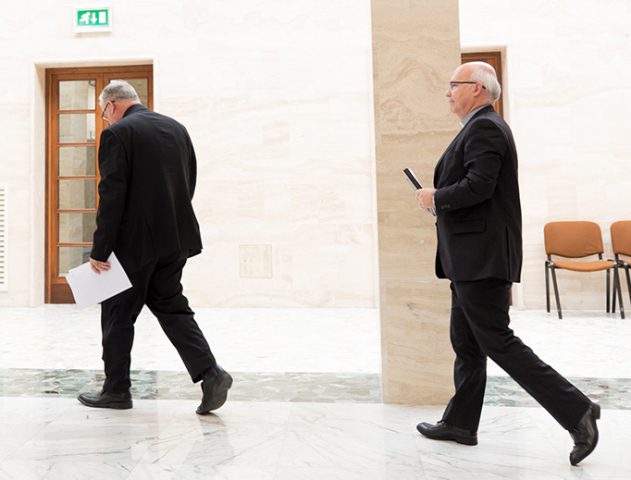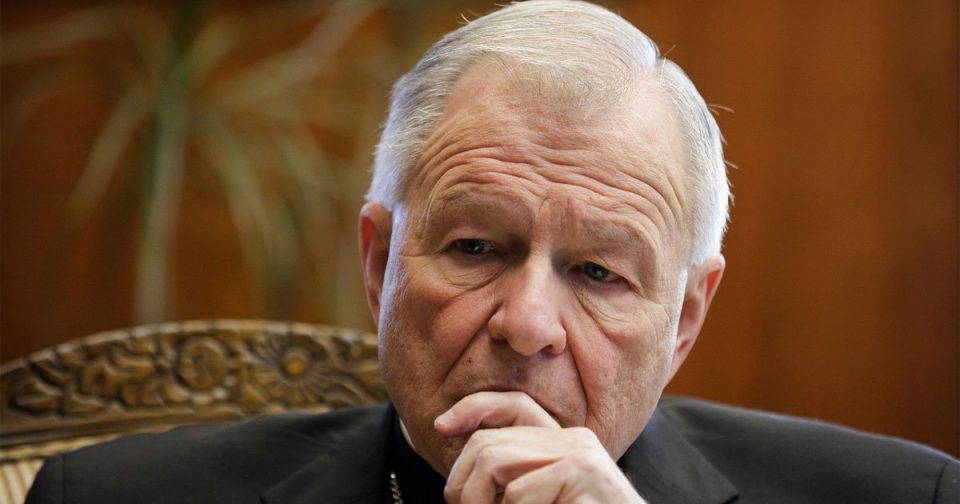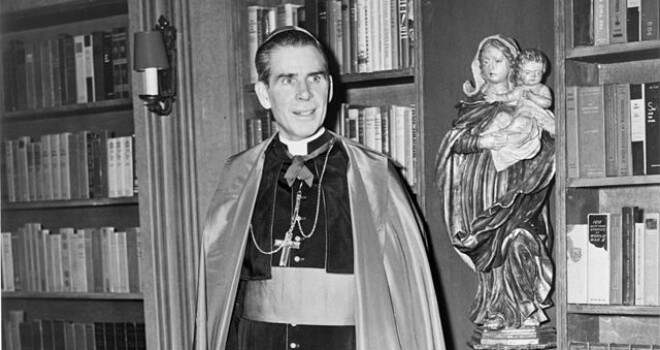Landmark Resignation of Chilean Bishops — What Happens Next

Pentecost and the Ministry of the Holy Spirit
May 21, 2018
A Look at the Fruits of the Holy Spirit
May 21, 2018
Photo: Bishop Fernando Ramos, auxiliary bishop of Santiago, and Bishop Juan Ignacio González of San Bernardo, a member of Chile’s national commission for the protection of minors, leave a press conference on May 18, 2018, announcing the resignation of all 34 Chilean bishops at the close of their 3-day meeting with Pope Francis in Vatican City.
Will the Pope accept some or all of the bishops’ resignations? And will other hierarchies in Latin America and beyond face the same treatment?
The decision of Chile’s 34 bishops to submit their resignations was inevitable after Pope Francis’ 10-page letter highly critical of the Church leadership in Chile was leaked this morning.
Francis issued a devastating critique of the Church’s handling of abuse cases. Not only did the letter include the notorious case of serial abuser Father Fernando Karadima, which also implicated four bishops in an alleged cover-up, but also other cases were cited involving religious orders including the Salesians, Franciscans and the Marist Brothers.
The mishandling included Church authorities referring to “not a few cases” of grave offenses as improbable; other cases led to delayed investigations or none at all. Still others were characterized by “very serious negligence.” Criminal acts were blamed on simple weakness, with some abusers transferred to other positions where they had “daily and direct contact with minors.”
The Pope said he was “perplexed and ashamed” by statements saying the Church officials responsible for investigating abuse allegations had been pressured, or that documents were destroyed.
He blamed in part a fractured seminary process, including the allowance of men with history of active homosexuality, but also stressed the need to recognize the underlying causes. He denounced himself but also held the entire Chilean episcopate responsible, too, saying no one could be exempted.
The Pope noted a “loss of prophetic strength,” called on the Chilean Church to again put Christ at the center, not itself, and warned against an “elite psychology,” clericalism and “messianism.” Prayer and sincere recognition of failings is necessary for grace to work, he added.
Showing clearly he expected resignations, he said removing people from office “must be done.” He called for the “roots and structures” of the Church to be tackled so such failures never happen again. And he warned the bishops against the temptation of wanting to “save their skin” and their reputations, but rather to “have seriousness and co-responsibility” to take on the problems as symptoms of an ecclesial whole.
Who Might Resign?
Will the Pope accept some or all of the bishops’ resignations? Certainly, the four bishops accused of covering up the Karadima abuse — Juan Barros, Andrés Arteaga, Tomislav Koljatic and Horacio Valenzuela — are likely to be accepted.
The Pope had initially defended Bishop Barros, saying he had received no evidence of the bishop’s guilt, and called accusations against him “calumny” during a trip to Chile in January. But on receiving the results of an investigation he later ordered, led by Archbishop Charles Scicluna, Francis apologized, held the May 15-17 meeting with the bishops in Rome, and met three of the most prominent abuse victims.
So what to make of today’s significant events? Some observers close to the Vatican strongly suspect the en masse resignation was orchestrated by the bishops, working with the Secretariat of State and the Pope himself.
They believe it highly likely that most of the bishops will have been assured that their positions are safe and will retain their positions, despite offering their resignations, except for the four bishops, and possibly a few others.
“It’s very sad and really unfortunate,” said a senior Church figure speaking to the Register on condition of anonymity.
He said the Chilean bishops “should have properly exercised their responsibilities,” but cautioned that the events of today could pose serious problems for episcopacies worldwide if whole bishops’ conference were similarly “told to pack their bags and go.”
It sets a “bit of a risky precedent,” he said, and wondered why the Pope didn’t order a commission to investigate which bishops should be held accountable.
Some are already wondering whether other hierarchies in Latin America and beyond will face the same treatment.
Structural problems and failures in handling of abuse cases are known to exist elsewhere, including Argentina. But one particular case in the news lately relates to Honduras and in particular the auxiliary bishop of the archdiocese of Tegucigalpa, Juan José Pineda.
Despite allegations of sexual abuse made against him beginning at least a decade ago, and a papal investigation last year, he remains in place and in charge of the archdiocese during the frequent absences of his close ally, the archbishop, Cardinal Óscar Rodríguez Maradiaga.




